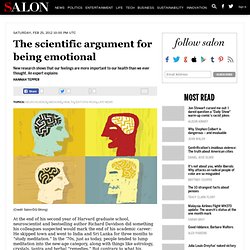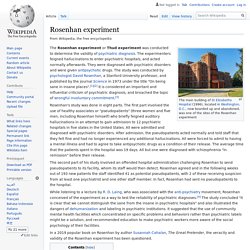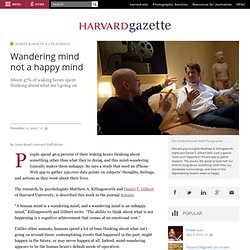

The scientific argument for being emotional. At the end of his second year of Harvard graduate school, neuroscientist and bestselling author Richard Davidson did something his colleagues suspected would mark the end of his academic career: He skipped town and went to India and Sri Lanka for three months to “study meditation.”

In the ’70s, just as today, people tended to lump meditation into the new-age category, along with things like astrology, crystals, tantra and herbal “remedies.” But contrary to what his skeptics presumed, not only did Davidson return to resume his studies at Harvard, his trip also marked the beginning of Davidson’s most spectacular body of work: neuroscientific research indicating that meditation (and other strictly mental activity) changes the neuroplasticity of the brain. Thirty years later, Davidson is still researching and writing about the intersection of neuroscience and emotion — he currently teaches psychology and psychiatry at the University of Wisconsin-Madison. That’s a great example. Rosenhan experiment.
Experiment to determine the validity of psychiatric diagnosis Rosenhan's study was done in eight parts.

The first part involved the use of healthy associates or "pseudopatients" (three women and five men, including Rosenhan himself) who briefly feigned auditory hallucinations in an attempt to gain admission to 12 psychiatric hospitals in five states in the United States. All were admitted and diagnosed with psychiatric disorders. After admission, the pseudopatients acted normally and told staff that they felt fine and had no longer experienced any additional hallucinations. All were forced to admit to having a mental illness and had to agree to take antipsychotic drugs as a condition of their release. The second part of his study involved an offended hospital administration challenging Rosenhan to send pseudopatients to its facility, whom its staff would then detect.
While listening to a lecture by R. Pseudopatient experiment[edit] Non-existent impostor experiment[edit] See also[edit] Psychology studies relevant to everyday life from PsyBlog. How to Hack Your Brain. Science & Nature - Human Body and Mind - Body - Senses Challenge. Your Amazing Brain. 50 Stress Relievers That Take 5 Minutes or Less. Classification of Emotions. Psychologists have yet to fully tackle the question “How many emotions do we have?” Part of the difficulty is because our experiences are so complex and involve so many different factors, so distinguishing one emotion from another is a lot like drawing lines of sand in the desert.
It can be hard to determine where one emotions ends or another begins. Even when we analyze a commonsense emotion like “happiness” or “anger,” we know from everyday experience that these emotions come in many different degrees, qualities, and intensities. Placebo Buttons. The Misconception: All buttons placed around you do your bidding.

The Truth: Many public buttons are only there to comfort you. You press the doorbell button, you hear the doorbell ring. You press the elevator button, it lights up. You press the button on the vending machine, a soft drink comes rattling down the chute. Your whole life, you’ve pressed buttons and been rewarded. The thing about buttons, though, is there seems to be some invisible magic taking place between the moment you press them down and when you get the expected result. Maybe there’s a man inside who pulls out the can of soda and puts it in the chute. You just don’t know, and that’s how conditioning works. The problem here is that some buttons in modern life don’t actually do anything at all. According to a 2008 article in the New Yorker, close buttons don’t close the elevator doors in many elevators built in the United States since the 1990s. Placebo buttons are a lot like superstitions, or ancient rituals.
Sources: Wandering mind not a happy mind. People spend 46.9 percent of their waking hours thinking about something other than what they’re doing, and this mind-wandering typically makes them unhappy.

So says a study that used an iPhone Web app to gather 250,000 data points on subjects’ thoughts, feelings, and actions as they went about their lives. The research, by psychologists Matthew A. Killingsworth and Daniel T. Gilbert of Harvard University, is described this week in the journal Science. “A human mind is a wandering mind, and a wandering mind is an unhappy mind,” Killingsworth and Gilbert write. Unlike other animals, humans spend a lot of time thinking about what isn’t going on around them: contemplating events that happened in the past, might happen in the future, or may never happen at all. Subjects could choose from 22 general activities, such as walking, eating, shopping, and watching television.
“Mind-wandering appears ubiquitous across all activities,” says Killingsworth, a doctoral student in psychology at Harvard.